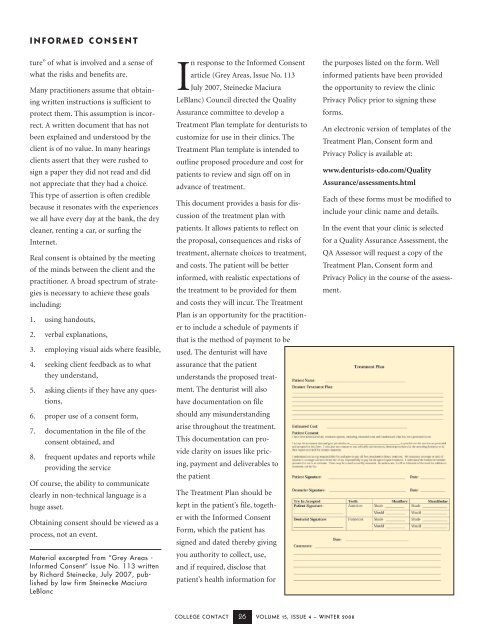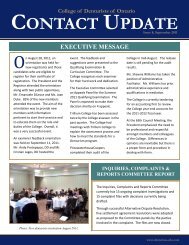College Contact
College Contact - Winter 2009 - College of Denturists of Ontario
College Contact - Winter 2009 - College of Denturists of Ontario
Create successful ePaper yourself
Turn your PDF publications into a flip-book with our unique Google optimized e-Paper software.
INFORMED CONSENT<br />
ture” of what is involved and a sense of<br />
what the risks and benefits are.<br />
Many practitioners assume that obtaining<br />
written instructions is sufficient to<br />
protect them. This assumption is incorrect.<br />
A written document that has not<br />
been explained and understood by the<br />
client is of no value. In many hearings<br />
clients assert that they were rushed to<br />
sign a paper they did not read and did<br />
not appreciate that they had a choice.<br />
This type of assertion is often credible<br />
because it resonates with the experiences<br />
we all have every day at the bank, the dry<br />
cleaner, renting a car, or surfing the<br />
Internet.<br />
Real consent is obtained by the meeting<br />
of the minds between the client and the<br />
practitioner. A broad spectrum of strategies<br />
is necessary to achieve these goals<br />
including:<br />
1. using handouts,<br />
2. verbal explanations,<br />
3. employing visual aids where feasible,<br />
4. seeking client feedback as to what<br />
they understand,<br />
5. asking clients if they have any questions,<br />
6. proper use of a consent form,<br />
7. documentation in the file of the<br />
consent obtained, and<br />
8. frequent updates and reports while<br />
providing the service<br />
Of course, the ability to communicate<br />
clearly in non-technical language is a<br />
huge asset.<br />
Obtaining consent should be viewed as a<br />
process, not an event.<br />
Material excerpted from “Grey Areas -<br />
Informed Consent” Issue No. 113 written<br />
by Richard Steinecke, July 2007, published<br />
by law firm Steinecke Maciura<br />
LeBlanc<br />
In response to the Informed Consent<br />
article (Grey Areas, Issue No. 113<br />
July 2007, Steinecke Maciura<br />
LeBlanc) Council directed the Quality<br />
Assurance committee to develop a<br />
Treatment Plan template for denturists to<br />
customize for use in their clinics. The<br />
Treatment Plan template is intended to<br />
outline proposed procedure and cost for<br />
patients to review and sign off on in<br />
advance of treatment.<br />
This document provides a basis for discussion<br />
of the treatment plan with<br />
patients. It allows patients to reflect on<br />
the proposal, consequences and risks of<br />
treatment, alternate choices to treatment,<br />
and costs. The patient will be better<br />
informed, with realistic expectations of<br />
the treatment to be provided for them<br />
and costs they will incur. The Treatment<br />
Plan is an opportunity for the practitioner<br />
to include a schedule of payments if<br />
that is the method of payment to be<br />
used. The denturist will have<br />
assurance that the patient<br />
understands the proposed treatment.<br />
The denturist will also<br />
have documentation on file<br />
should any misunderstanding<br />
arise throughout the treatment.<br />
This documentation can provide<br />
clarity on issues like pricing,<br />
payment and deliverables to<br />
the patient<br />
The Treatment Plan should be<br />
kept in the patient’s file, together<br />
with the Informed Consent<br />
Form, which the patient has<br />
signed and dated thereby giving<br />
you authority to collect, use,<br />
and if required, disclose that<br />
patient’s health information for<br />
the purposes listed on the form. Well<br />
informed patients have been provided<br />
the opportunity to review the clinic<br />
Privacy Policy prior to signing these<br />
forms.<br />
An electronic version of templates of the<br />
Treatment Plan, Consent form and<br />
Privacy Policy is available at:<br />
www.denturists-cdo.com/Quality<br />
Assurance/assessments.html<br />
Each of these forms must be modified to<br />
include your clinic name and details.<br />
In the event that your clinic is selected<br />
for a Quality Assurance Assessment, the<br />
QA Assessor will request a copy of the<br />
Treatment Plan, Consent form and<br />
Privacy Policy in the course of the assessment.<br />
COLLEGE CONTACT 26 VOLUME 15, ISSUE 4 – WINTER 2008




